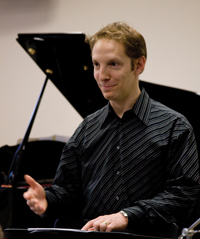Faculty Profile: Michael Wartofsky
 |
|
| Associate Professor Michael Wartofsky | |
| Jennifer Shanley |
"Curtain Up" was a first for the college: a concert of original musical-theater songs written and arranged by Berklee students. In March the show packed the David Friend Recital Hall and displayed not only the usual impressive range of talent but also the recent surge of interest in a musical genre that only rarely receives the spotlight at the college.
The Boylston Street-to-Broadway transformation for one night happened largely through the dynamism of Michael Wartofsky, an associate professor of harmony at Berklee. "He's a major force," says Lisa Forkish,'10, a student in Wartofksy's two musical-theater writing courses. "He makes things happen."
A composer, teacher, and adviser, Wartofsky has fostered interest in musical theater at Berklee. He and collaborator Sukari Jones garnered accolades and packed the Friend Recital Hall in March 2009 for a concert reading of their musical The River Is Me. The piece is based on an event that mobilized the civil-rights movement: the brutal 1955 murder of Emmett Till, an African-American boy. Wartofsky and three faculty members ("Curtain Up" codirector Jeri Sykes, Omar Thomas, and Tom Carr) later recorded eight tracks from the show with a student cast and orchestra funded with a Berklee Faculty Recording Grant. "The students had a phenomenal experience doing it because of the subject matter," Wartofsky says, noting that the tragic story line also conveyed hope and healing. "Several students said it changed their lives."
Wartofsky describes "Curtain Up" as an "ambitious undertaking": the event featured 15 original songs written by 21 students in the "Musical Theater Writing" course, was arranged by 13 students in the "Musical Theater Arranging and Orchestration" course, and was performed by a 13-piece band. "We are crazy enough to say, 'Let's do the things we don't have to do,'" he notes. The caliber of the songs "blew our minds," he recounts. "We have some really promising musical-theater writers."
"It was an incredible opportunity," Forkish says. Writers not only heard their own work performed but also sat in on the vocalist auditions and provided feedback. "Our opinions really counted," songwriter Michael Hazani '10 adds. "I really got a sense of how the real world works." Wartofsky "is one of the most demanding teachers I've ever had at Berklee, but when you really need the encouragement, he's supportive."
Wartofsky says he's always been interested in musical theater. After graduating from Harvard University in 1991, he earned a master's degree in composition from New England Conservatory in 1994 and a master of fine arts from New York University in 1997.
Then, attracted by Berklee's "rigorous, yet open-minded" approach, he attended the college for a year to study jazz and pop music. It changed the way he thought about music and how he composed. He wrote the music and lyrics for The Man in My Head, a work performed at the New York Musical Theater Festival in 2006, and he composed the children's show Friendship of the Sea for the North Shore Musical Theater in Beverly, MA.
When Wartofsky joined the Berklee faculty in 1997, the college was ready for a musical-theater writing course that concentrated on song form and storytelling. Thanks to hip musicals such as Spring Awakening and movies like Moulin Rouge, musical theater has lost its stigma among college students. "[Those shows] have created a new generation of students," Wartofksy contends. "Some of our students are really poised to shake things up," he adds.
Berklee students also have a role model in Alex Lacamoire '95, who won a Tony award for his musical direction of the Broadway musical In the Heights. At Wartofsky's invitation, Lacamoire was a recent guest lecturer in his "Musical Theater Writing" class.
Wartofsky's musical-theater class "broadened my horizons," Hazani says, and helped him learn how to critique his own work and that of others. "He gives you the tools and some freedom. He's very accepting. He let me develop my own views." Hazani recalls writing a negative assessment of The Color Purple, a musical that is among Wartofsky's favorites. It earned a high grade. In particular, Hazani learned from Wartofsky about "universality": that is, understanding that music can be serious even if it's very popular. Shying away from mass-audience appeal is not the way to go.
Forkish says Wartofsky's courses are a lot of work. "I worked hardest in his classes," she says. "He works so hard for his students. He's very professional, extremely organized. You can tell he knows what he's doing. He's a real honest-to-God teacher."
Naturally, Wartofsky is a faculty adviser to the Berklee Musical Theater Club, but he's involved in other areas of the college too. He brought his love of Yiddish culture and language to Berklee and launched the Klezmer and Yiddish Music Ensemble. "You can play Klezmer on any instrument," he notes. "And it is so fun." He is also active in gay and lesbian organizations at Berklee, serving as the steering committee chair for the faculty group GLBT Allies at Berklee, which works to promote a safe and supportive campus atmosphere for the gay, lesbian, bisexual, and transgendered members of the Berklee community, and advises the student Berklee Union of Gays, Lesbians, and Everyone Else (BUGLE). He is also the founder of the New Opera and Musical Theater Initiative, a greater Boston nonprofit group that supports writers of new musicals.
Wartofsky's dedication to his students though, "goes above and beyond," according to Forkish. She points to her senior recital as an example. "I invited all my teachers. He was the only one who came."
